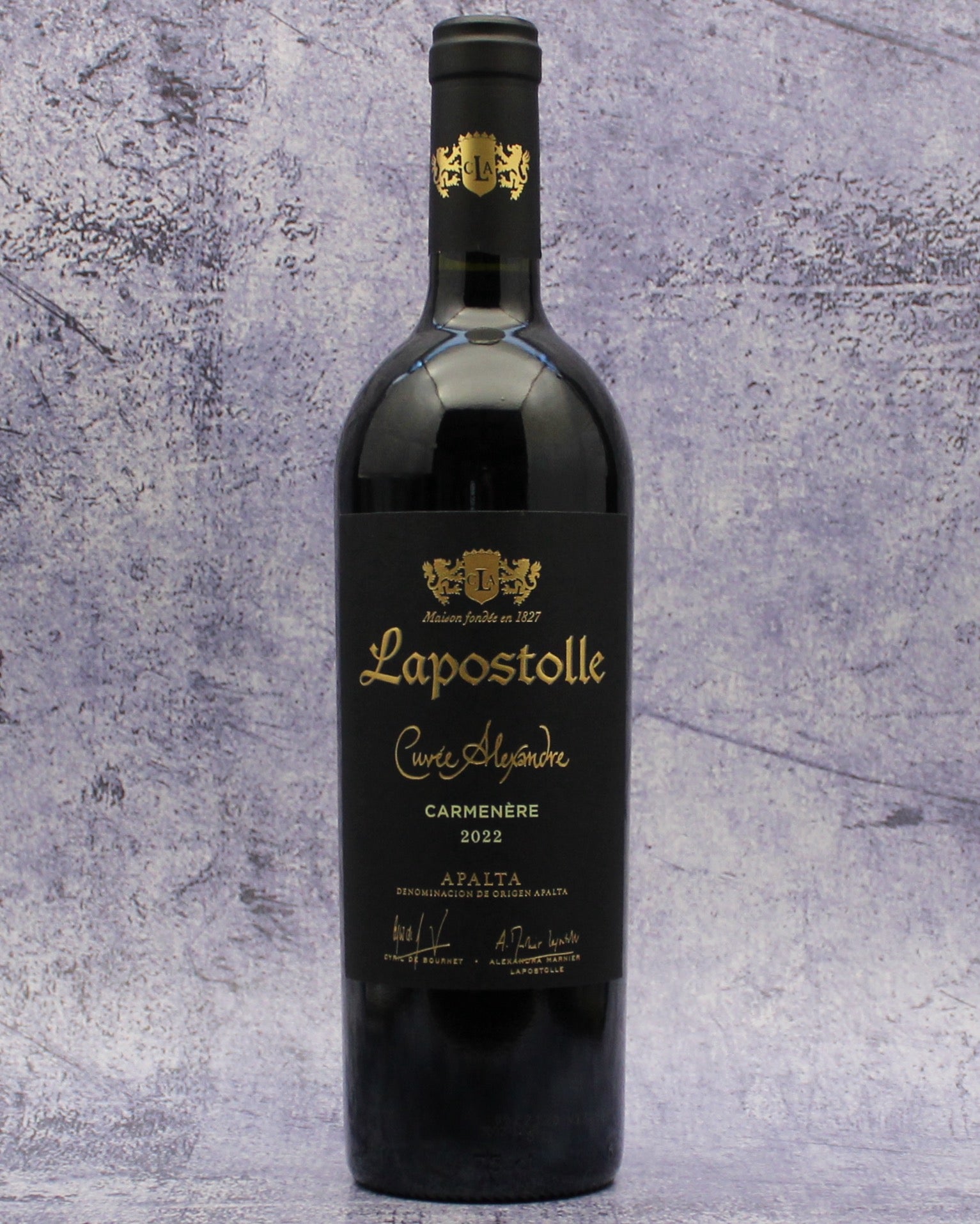From: Cunaco, Apalta Valley, Argentina
Varietals: 92% Carmenere, 6% Cabernet Sauvignon, and 2% Syrah
Tasting Notes and Critical Acclaim: “The 2022 Carménère Cuvée Alexandre, sourced from Apalta in the Colchagua Valley, presents a ripe and precise expression. Purple in hue, it exudes soft ash and marmalade aromas with hints of blackberry and boldo. Dry, rich and bold, the voluminous palate is fairly fleshy and reactive due to its muscular, rounded tannins. This is an intense and flavorful Apalta Carménère.” — 92 Points, Vinous, Jul 2024
“A fresh, spicy carmenere loaded with fruit. Dark cherries, tobacco, pepper, spices and touches of paprika, dark olives, graphite and dark chocolate. Juicy and fruit-expressive on the palate with a medium to full body and fresh, fine-grained tannins. Flavorful and long. Always a great buy for the price.” — 94 Points, James Suckling, Feb 2024
“Andrea Leon uses 6% Cabernet Sauvignon and 4% Syrah to build some extra layers of flavour into her Carmenere. Matured in 9% new wood, it’s inky, dense and concentrated, with plenty of alcohol, subtle oak spices, garrigue, fig and dark chocolate flavours and plenty of tannic backbone.” — 90 Points, Tim Atkin, MW, May 2024
Pairing: Its muscular tannins and complex palate make it an excellent match for grilled lamb chops, where the wine’s dark cherry and tobacco notes enhance the savory richness of the meat. For a Chilean touch, try Pastel de Choclo, a hearty corn pie that plays off the wine's bold spices and juicy fruit, or Carne Mechada, a slow-cooked beef dish where the wine’s dark chocolate and paprika notes complement the flavors of the dish. On the American side, a smoky barbecue brisket is perfect for this Carménère, as the wine’s pepper and subtle oak spices balance the meat's smoky profile. At the same time, a blue cheese burger highlights the dark olive and graphite undertones. For more Mediterranean flavors, lamb kebabs with rosemary and thyme bring out the wine’s garrigue and fig qualities. For a different pairing, try a grilled portobello mushroom burger. The mushroom's meaty texture complements the wine’s robust structure, while its earthy flavors enhance the Carmenere's dark fruit and subtle spice notes.
Pastel de Choclo (Beef and Corn Casserole)
By Ham El-Waylly
About. Lapostolle, founded in 1994 by Alexandra Marnier Lapostolle and her husband Cyril de Bournet, represents a seamless marriage of French winemaking expertise and the untapped potential of Chilean terroir. With a heritage dating back to 1827, when the Bournet-Lapostolle family first began crafting fine spirits and wines, Lapostolle has evolved into one of the most recognized and esteemed wineries in Chile, a country with which the family instantly fell in love during their visit to the Apalta Valley.
The unique geographical characteristics of Chile, especially the Apalta Valley, captivated Alexandra and Cyril, who quickly realized the region’s potential to produce high-quality wines. This vision propelled them to establish Lapostolle as a pioneer in Chile's wine industry, blending traditional French winemaking techniques with Chile's rich natural resources. Today, their son, Charles de Bournet, carries on the family legacy, leading the estate with the same unwavering commitment to quality that once made Grand Marnier a global sensation.
The Apalta Valley, home to Lapostolle's three vineyards—Clos Apalta, Clos du Lican, and Saint Joseph—forms the foundation for the winery’s exceptional range of wines. Each vineyard is a testament to the region’s diverse landscape and unique geological history. The Clos Apalta Vineyard, for instance, is cradled by the horseshoe-shaped hills of the Cordillera de la Costa and the Tinguiririca River, its soils rooted in ancient granitic and granodioritic formations from the Cretaceous period. The challenging north-south exposure and angular, well-decomposed stones provide ideal conditions for vines to thrive. Meanwhile, the Clos du Lican and Saint Joseph vineyards contribute their distinct terroirs, defined by southern exposures and gentle slopes, to Lapostolle’s mosaic of wines, which include varietals like Mourvèdre, Cinsault, Grenache, and Syrah.
The winery's holistic approach to sustainability is certified by the "Certified Sustainable Wine of Chile,” Demeter, and LSQA Latu+QualityAustria certifications, affirming Lapostolle’s position as a leader in sustainable winemaking in the country.
Wine Notes: Crafted from estate-grown grapes in the El Condor de Apalta vineyard, the wine reflects the region's unique terroir with its granitic soils and northern exposure. This Carmenere blend, composed of 92% Carmenere, 6% Cabernet Sauvignon, and 2% Syrah, undergoes cold maceration before fermentation in stainless steel tanks, allowing for gentle extraction. The wine spends up to four weeks on its skins before being aged in French oak barrels for 12 months, utilizing a mix of 15% new, 23% second-use, and 62% third-use barrels to achieve a balanced maturation. The vineyard, planted in 1920 and certified biodynamic by Demeter, produces approximately 39,000 bottles of this cuvée yearly. The eco-friendly practices employed in the vineyard and winery underscore Lapostolle’s commitment to sustainable viticulture while creating a wine embodying innovation and heritage.

